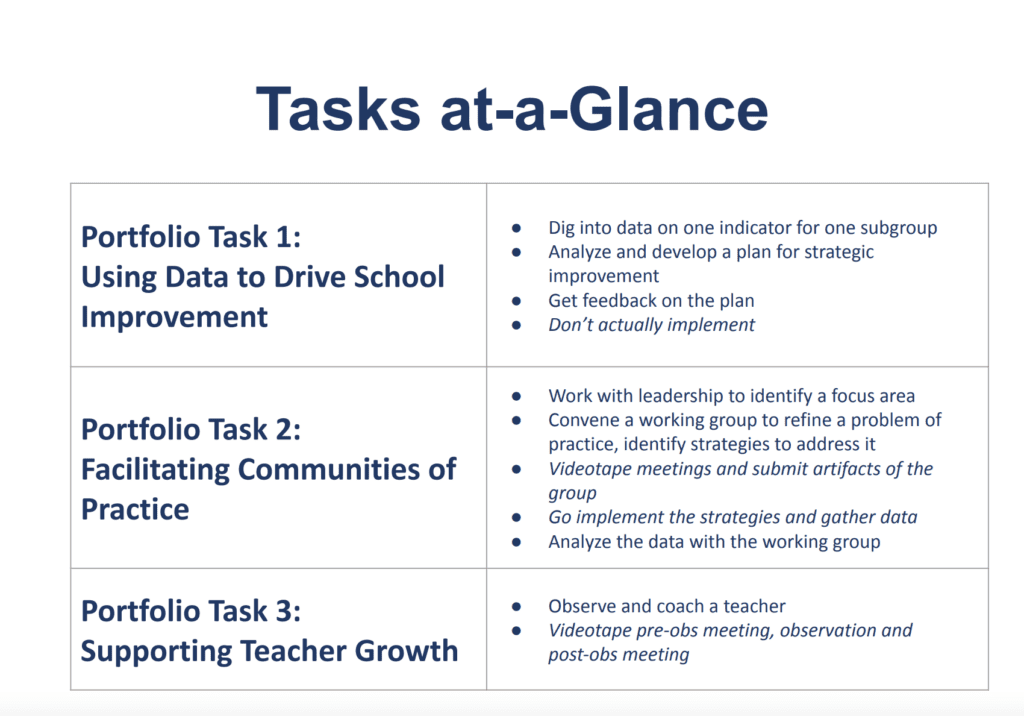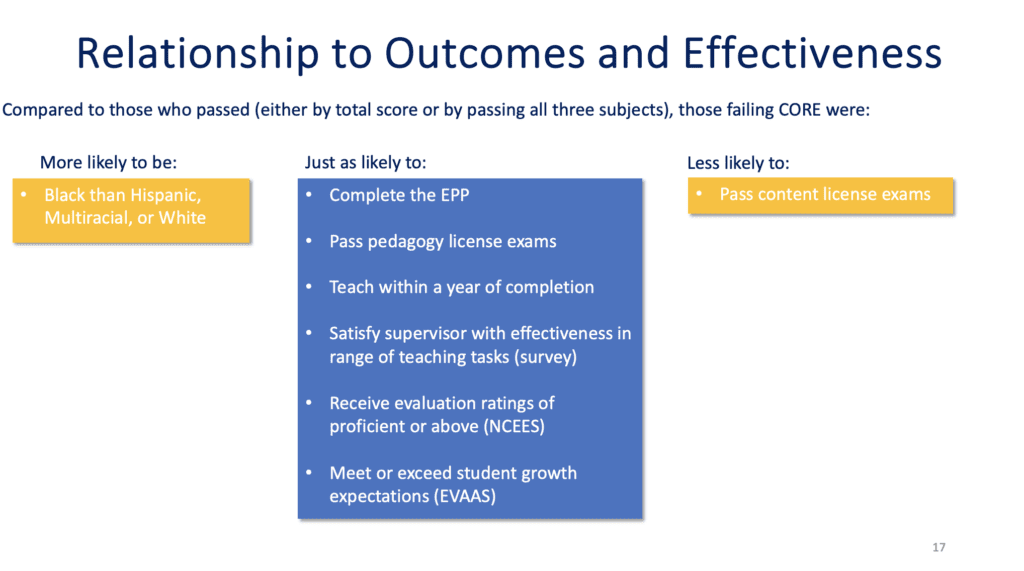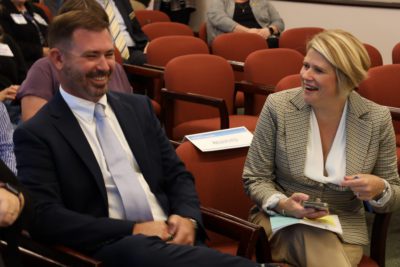
|
|
The State Board of Education’s virtual meeting on Thursday included multiple discussions related to educator preparation and licensure — including the approval of a portfolio assessment for principals.
The 2023 budget directed the Department of Public Instruction (DPI) to create a portfolio-based assessment for principal licensure. This change was recommended by DPI.
On Thursday, the Board approved the North Carolina Principal Portfolio Assessment (NCPPA), created by a task force on principal standards, licensure, and evaluation. The task force researched the portfolio-based assessment system and met from January 2024 to May 2024.
Five states are currently implementing a portfolio assessment, the task force found.
“The most viable choice was to leverage an existing state-specific assessment (CalAPA) and work with Pearson to contextualize to North Carolina needs,” DPI’s presentation says.
According to state law, principal candidates who have “completed at least one course as part of a master’s degree program or a post-master’s certificate designed for school administrators that was offered by an educator preparation program approved by the State Board of Education” by Aug. 31, 2024, will not be required to take the new assessment.
“A candidate who has not completed at least one course towards a degree or licensure-only program by August 31, 2024 must complete all requirements for the principal license, including taking the North Carolina Principal Portfolio Assessment,” DPI’s presentation says.
Here’s a look at the main tasks the portfolio includes:

Now that the portfolio has been approved, DPI will work with the vendor to develop training resources, professional development, and a passing cut score — to be approved by the Board.
DPI and the task force worked to also align the assessment with the North Carolina Standards for School Executives: strategic leadership, instructional leadership, cultural leadership, human resource leadership, managerial leadership, external leadership, and micro-political leadership.
Board member Olivia Oxendine expressed concerns about the portfolio. While she said she appreciated the efforts of the task force, she had concerns about the assessment’s lack of integration regarding state standards on cultural, managerial, external, and micro-political leadership.
According to DPI’s presentation, the assessment “partially assesses (these) elements.”
You can view DPI’s full presentation, including task force membership, here. You can also read more about the portfolio’s tasks and rubrics on the Board’s website.
Recommended removal of skills test for teachers
In a 8-3 vote, the Board also recommended removing a preprofessional skills assessment as part of the criteria to enter an educator preparation program (EPP). The Board will include the recommendation in its legislative agenda for an upcoming legislative session.
Only college students entering educator preparation programs are required to take the tests, meaning that teachers who enter through alternative pathways do not.
According to a presentation to the Board, this exam is a barrier to admission which hinders the diversification of the teacher pipeline.
There are “numerous examples of highly effective educators who did not pass the Praxis Core,” the presentation said.

Oxendine voted against the recommendation, along with Republicans Lt. Gov. Mark Robinson and Treasurer Dale Falwell.
“There seems to be a chipping away of high standards,” Oxendine said. “It’s important that we maintain the highest of standards when it comes to ensuring the highest quality, the most competent level, of future teachers to place in our classrooms.”
The Board also approved a few other changes affecting educator preparation and licensure.
Among other things, the Board approved criteria for pedagogy requirements for Residency Licensure (RL) programs, preservice training and field experience for RL teachers, and preservice training and field experience for the indicated license holder.
The Board also recommended criteria to calculate the grade point average requirement(s) to enter an EPP. The recommendation states that prospective teachers must have a minimum GPA of 2.7 in at least 18 credit hours of courses relevant to their area of licensure.
You can view the full presentation on recommended changes here.
Finally, the Board approved a report on EPP initial authorization alternative EPP’s, completed by a Board subcommittee.
That report includes the following recommendations:
Study considered complete. “The subcommittee recommends that this phase of its work be considered complete and that DPI staff be authorized to resume bringing applications to the State Board for EPP approval.”
Expand single-accreditor preference. “Legislation names two paths to approval: (1) CAEP accreditation; or (2) approval by State Board based on its adopted policy. There are only two approved national accreditors, and the subcommittee questioned whether North Carolina is inadvertently granting a preference to one over the other. The subcommittee recommends asking the General Assembly to add AAQEP accreditation as a path to approval. The subcommittee further recommends, in the meantime, adding AAQEP accreditation to its policy for approval.”
Independent review of criteria. “The subcommittee was impressed by the CAEP standards as criteria for its recommendation, but believes the criteria should be reviewed by DPI staff to ensure it meets the standards by which North Carolina EPPs are held accountable. The subcommittee would like DPI to conduct this review and present any recommendations to the State Board.”
Need for accountability to go through rulemaking. “The subcommittee believes a higher-impact method of ensuring approved EPPs are meeting future teacher workforce needs and quality is to have the ability to hold approved EPPs accountable for meeting legislative requirements. Currently, while legislation creating EPP accountability was enacted in 2017, the enforcement mechanisms have not gone through rulemaking. This limits the State Board’s enforcement capacity. The subcommittee would like recommendations from DPI staff regarding a process and timeline for proposing and adopting rules.
Recommendations from EPP report.
Supporting public schools
In recent months, Board Chair Eric Davis has made several comments in support of North Carolina’s public schools.
In March, Democratic Gov. Roy Cooper joined the Board’s meeting to discuss the importance of fully funding North Carolina’s public schools.
“This Board has an enduring commitment to preserving our state’s great public school system and the importance of recruiting, developing, and retaining high-quality, dedicated teachers,” Davis said to introduce Cooper. “We’re fortunate to have a governor who is a champion of our public schools.”
Last May, Cooper issued a state of emergency for public schools after the Republican-led General Assembly introduced legislation to expand school choice statewide. Since then, Cooper also declared 2024 “The Year of Public Schools,” visiting more than 50 places across the state to talk about the importance of public schools.
“Our public schools are doing amazing work,” Cooper said in March.
Earlier this week, two statewide organizations launched campaigns to build support for public schools.
On Wednesday, the North Carolina School Boards Association launched a campaign “to build support for public schools as a bedrock benefit for every North Carolinian.”
The campaign — “Public Education Does the Public Good” — says supporting public schools is a nonpartisan priority.
“Thriving public schools uplift society as a whole, no matter what type of education fits your family’s needs,” Jennifer Thompson, president NCSBA’s Board of Directors, said in a press release. “Public education was a cornerstone of the foundation of America for many reasons. Everyone benefits from a strong public school system. We all need to support our public schools.”
Last month, the North Carolina Association of Educators (NCAE) launched a similar campaign, “We Love Public Schools.”
The campaign includes local visits from NCAE President Tamika Walker Kelly, to discuss the importance of public schools and why public support matters.
“Despite all the good work happening in our public schools, they are at risk of falling behind,” the campaign website says. “From the mountains to the coast, North Carolinians love their public schools and only together can we strengthen our public schools for the next generation and generations to come. Nothing could be more basic for the future health of our state. We ♥ Public Schools!”
Portrait of a Graduate impact
The durable skills included in DPI’s Portrait of a Graduate are essential to every occupation in the state, according to a new analysis from the North Carolina Department of Commerce’s Labor and Economic Analysis Division (LEAD).
Those durable skills include: adaptability, collaboration, communication, critical thinking, empathy, learner’s mindset, and personal responsibility.
The analysis was presented to the Board on Thursday. State Superintendent Catherine Truitt said the analysis highlights the need to continue integrating durable skills into day-to-day learning across the state.
“In addition to academic knowledge, our graduates must also develop the ability to collaborate and communicate with others, adapt to challenging situations and think critically about the information presented to them to excel in the 21st century workforce,” Truitt said in a DPI press release.
Here are key findings from the analysis, as highlighted by DPI:
- In every occupation and every “career cluster,” the Portrait’s durable skills rank at least as “somewhat important,” meaning that workers need those skills to be effective in their jobs.
- Occupations that value durable skills as “very important” tend to also be those that pay better.
- Projected employment growth tends to be higher for occupations that place the highest importance on durable skills.
- Occupations that require at least a bachelor’s degree tend to place a higher level of importance on durable skills than those requiring less education; however, these skills are important for jobs across every level of education. For example, many occupations requiring an associate degree or less — such as electricians, chefs and nurses — classify the durable skills as either “important” or “very important.”
“I want every North Carolina student to leave our public schools prepared to enter the workforce, join the military or pursue higher education,” Truitt said. “We must integrate durable skills into classroom curricula so that our graduates are equipped to succeed in family-sustaining jobs that are essential to our state’s economy.”
You can read more about the analysis on DPI’s website.
New art and world language standards, and more
Here is a look at other business items from Thursday’s meeting:
- The Board approved the 2024 North Carolina Standard Course of Study for K-12 Arts Education and World Languages. You can view EdNC’s previous coverage of the new art standards on our website.
- The Board approved a number of draft rules which clarify rules already passed by the Board, including student graduation and parental concern hearings. You can read those documents in the Board’s meeting materials. The draft rules must now be submitted for public notice and comment.
- This year’s biannual planning and work retreat was originally scheduled for Nov. 5-7, which would conflict with Election Day. The Board voted to move that retreat to Dec. 3-5 instead.
- The 2023 budget required DPI to develop a uniform definition for “academically or intellectually gifted student” to be used throughout the state, prior to determining the allocation of funds for the 2024-2025 school year. On Thursday, the Board approved a new definition policy, which includes information on how gifted students should be identified.
- The Board also voted to add two additional high school diploma endorsements, Arts Proficiency and NC Citizenship Proficiency, as required by the General Assembly. You can read more about those endorsements here.
- Finally, the Board also approved the Comprehensive Plan for Reading Achievement (CPRA) Implementation Guide (previously referred to as the Read to Achieve Implementation Guide), updated to meet legislative requirements in the 2023 budget and stakeholder feedback. You can read the working copy here.
The full Board meets next July 31-Aug. 1.
Correction: This article previously said Oxendine voted against the principal portfolio. While Oxendine expressed concerns about the portfolio, she ultimately voted for it. The article has been updated.








